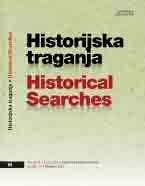“NAŠA IZBORNA BORBA”, MEĐUSTRANAČKI SUKOBI U BOSNI I HERCEGOVINI UOČI IZBORA ZA USTAVOTVORNU SKUPŠTINU 1920. GODINE
“OUR ELECTORAL STRUGGLE” INTERPARTY CONFLICTS IN BOSNIA AND HERZEGOVINA ON THE EVE OF THE ELECTIONS FOR THE CONSTITUTIONAL ASSEMBLY IN 1920
Author(s): Enes S. OmerovićSubject(s): History
Published by: Institut za istoriju
Keywords: Kingdom of Serbs; Croats and Slovenes; interparty conflicts; Communist Party of Yugoslavia; Yugoslav Social-Democrat Party; Yugoslav Democrat Party; Peoples’ Radical Party; Serb Peoples’ Organization; The League of Workers; Yugoslav Muslim Organization
Summary/Abstract: The image of political circumstances in Bosnia and Herzegovina during the state and legal provisory (1918-1921) was filled with conflicts between political parties, their leaders, members and sympathizers. The rivalry between the different political groups and parties was visible from the very first days of the Kingdom of Serbs, Croats, and Slovenes and was constantly intensifying, culminating in November 1920 immediately before the elections for the Constitutional Assembly. The conflicts were verbal and physical and occurred in all fields of activities of political parties — via party press, in immediate contact with the population on the ground and through the work in representative bodies (The temporary people’s representative body and the Constitutional Assembly). The party press represented a significant tool in the hands of each political group and party in the communication with potential voters and political adversaries. This communication was achieved in different ways and had certain patterns which were applied by all political parties. Apart from the publishing of party programmes and opinions about various contemporary issues, significant space was dedicated to different party activities, reports from the held party assemblies and confidential meetings, but for us the most interesting were the debates with papers of other parties and political groups, the following of their activities and criticizing of their work and their opinions. Thereby the papers did not choose the means in order to discredit, humiliate and offend their political opponents. This was achieved by following the activities of the political opponents on the ground and by publishing the reports from their assemblies. As a rule reports about unsuccessful assemblies which were attended by a small number of people were published, during which the speakers were whistled at, insulted, and even physically attacked. The effect would be additionally charged by the publishing of reports from their own meetings which were well attended, greeted enthusiastically by the masses, etc. The critique of attitudes and actions of confronted political options brought to the opening of debates in party journals which sometimes took up so much space that certain issues were completely conceived as an answer to the writings of the others. The vocabulary of the communication was sometimes exceptionally harsh, especially immediately before the elections for the Constitutional Assembly. Many did not refrain from corruption facts, interpreting them wrongly, even making things up and lying, and all of this in order to discredit the political adversaries and to make them less dangerous in the race for the affinity of voters.
Journal: Historijska traganja
- Issue Year: 2013
- Issue No: 11
- Page Range: 171-212
- Page Count: 42
- Language: Bosnian

